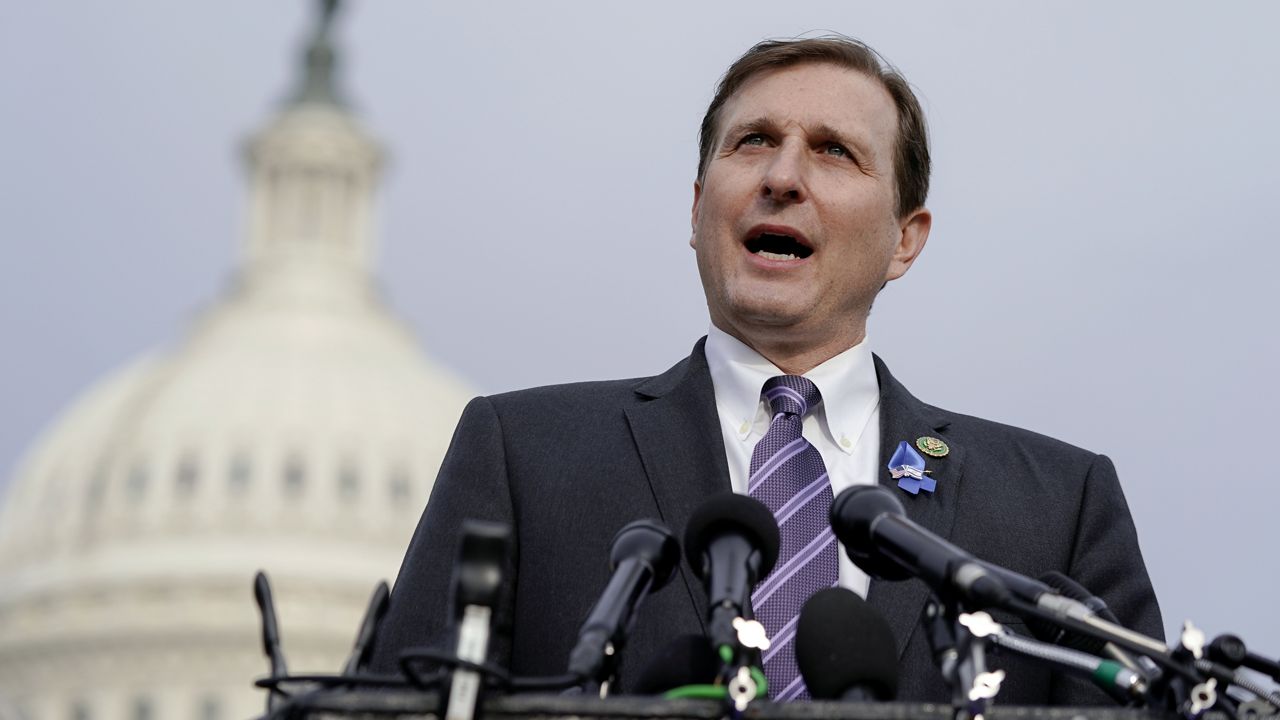Rep. Dan Goldman is not shrugging off President-elect Donald Trump’s comment Wednesday suggesting he’s open to serving a third term in the White House. Instead, Goldman, D-N.Y., is introducing a House resolution Thursday clarifying that Trump is, under the Constitution, ineligible to run again in 2028.
What You Need To Know
- Rep. Dan Goldman is not shrugging off President-elect Donald Trump’s comment Wednesday suggesting he’s open to serving a third term in the White House
- The New York Democrat is introducing a House resolution Thursday clarifying that Trump is, under the Constitution, ineligible to run again in 2028
- Goldman’s resolution would have the House reaffirm that the 22nd Amendment “applies to two terms in the aggregate as President of the United States” and that the amendment “applies to President-elect Trump"
- The congressman lists 15 examples in the resolution — including 14 statements by Trump himself — that he says points to a need to underscore Trump cannot continue to serve as president after Jan. 20, 2029
Speaking to House Republicans at the Capitol, Trump said, “I suspect I won’t be running again unless you say, ‘He’s so good we’ve got to figure something else out.'” The remark received some laughs.
Goldman’s resolution would have the House reaffirm that the 22nd Amendment “applies to two terms in the aggregate as President of the United States” and that the amendment “applies to President-elect Trump.”
“We are a nation of laws, not kings,” Goldman wrote Thursday on X, formerly Twitter. “The 22nd Amendment is clear that no person can be elected President more than twice. Any attempt by Donald Trump to do so is blatantly unconstitutional, and I call on my colleagues – D or R – to stand by their oath to defend the Constitution.”
Goldman’s proposal is not based solely on Trump’s comment Wednesday. The congressman lists 15 examples in the resolution — including 14 statements by Trump himself — that he says points to a need to underscore Trump cannot continue to serve as president after Jan. 20, 2029, the day his upcoming term ends.
Among those examples:
- In July, Trump told Christians at a conservative religious summit that they “won’t have to vote anymore” if he were reelected.
- In September 2020, he said at a campaign rally in Nevada: ‘‘We’re going to win four more years in the White House. And then after that, we’ll negotiate, right?”
- In multiple other speeches, Trump has mentioned the possibility of serving anywhere from three to five terms as president.
- In March 2018, he said he thought it was “great” that Chinese President Xi Jinping was “president for life,” adding, “Maybe we’ll give that a shot someday.”
“This is his MO,” Goldman told reporters Thursday. “He will drop in something outlandish, claim he's joking, but then he starts to repeat it more and more, and it starts to become normalized.”
Rep. Troy Nehls, R-Texas, sought to dismiss any concern of Trump extending his stay in the White House beyond his upcoming term.
“President Trump's going to be president for four more years,” he said. “That's what we have. Stop all this stuff.”
It’s unlikely that House Speaker Mike Johnson, R-La., will bring Goldman’s resolution up for a vote.
The 22nd Amendment states, “No person shall be elected to the office of the President more than twice.” It was proposed by Congress in 1947, three years after Franklin D. Roosevelt was elected for the fourth time, and then ratified in 1951.
The amendment also says a person who acted as president for more than two years of a term can only be elected once.
Repealing the amendment would require another amendment being passed, a complicated process. There are two methods for proposing an amendment: a two-thirds vote of both the Senate and House or a two-thirds approval of state legislatures at a convention called by Congress. The latter method has never been used.
Congress would then choose between two methods for ratifying the amendment, either by a three-quarters majority of state legislatures or by a three-fourths majority of state ratifying conventions.
Only one constitutional amendment has ever been repealed — the 18th Amendment, which established Prohibition.



